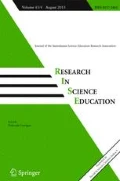Abstract
Five year old children's ideas were tracked by a range of means during and subsequent to a classroom sequence on evaporation. They held a range of conceptions which changed in complex ways across context and time. These could only be made sense of by moving outside traditional conceptual change interpretations to include broader notions of appropriation of language as a cultural tool, of personal and social narrative responses to features of the phenomena and the classroom setting, and the nature of science explanations. The findings are used to explore the relationship between social and individual perspectives on learning, and to question some assumptions underlying conceptual change research.
Similar content being viewed by others
References
Bar, V., & Galili, I. (1994). Stages of children's views about evaporation.,International Journal of Science Education, 16(2), 157–174.
Bar, V., & Travis, A. (1991). Children's views concerning phase changes.Journal of Research in Science Teaching, 28(4), 363–382.
Bruner, J. (1996).The culture of education. Cambridge, MA: Harvard University Press.
Carey, S. (1986). Cognitive science and science education.American Psychologist, 41, (10) 1123–1130.
Cobb, P. (1994). Where is the mind?Educational Research, 23(7), 13–20
Driver, R., & Easley, J. (1978). Pupils and paradigms: A review of literature related to conceptual development in adolescent science students.Studies in Science Education, 5, 61–84.
Driver, R., Asoko, H., Leach, J., Mortimer, E., & Scott, P. (1994). Constructing scientific knowledge in the classroom.Educational Researcher, 23(7), 5–12.
Driver, R., Leach, J., Millar, R., & Scott, P. (1996).Young people's images of science, Milton Keynes, UK: Open University Press.
Driver, R., Leach, J., Scott, P., & Wood-Robinson, C. (1994). Young people's understanding of science concepts: Implications of cross-age studies for curriculum planning.Studies in Science Education, 24, 75–100.
Duschl, R., & Gitomer, D. (1991) Epistemological perspectives on conceptual change: Implications for classroom practice.Journal of Research in Science Teaching, 28(9), 839–858.
Garnett, P., Garnett, P., & Hackling, M. (1995). Student's alternative conceptions in chemistry: A review of research and implications for teaching and learning.Studies in Science Education, 25, 69–95.
Hennessy, S., & Murphy, P. (1999). The potential for collaborative problem solving in esign and technology.International Journal of Technology and Design Education, 9(1), 1–36.
Hennessy, S. (1993). Stuated cognition and cognitive apprenticeship: Implications for classroom learning.Studies in Science Education, 22, 1–41.
Lemke, J. (2000). Articulating communities: Sociocultural perspectives on Science Education. http://academic.brooklyn.cuny.edu/education/jlemke/papers
Metz, K. (1997) On the complex relation between cognitive developmental research and children's science curricula.Review of Educational Research, 67(1), 151–163.
Pintrich, P., Marx, R., & Boyle, R. (1993). Beyond cold conceptual change: The role of motivational beliefs and classroom contextual factors in the process of conceptual change.Review of Educational Research, 63(2), 167–199.
Rahayu, S., & Tytler, R. (1999). Progression of primary school children's conception of burning: toward an understanding of the concept of substance.Research in Science Education, 29(3), 295–312.
Ramadas, J., & Driver, R. (1991). Response to Martin Monk's paper ‘Genetic epistemological notes on recent research into children's understanding of light’International Journal of Science Education, 13(3), 266–268.
Resnick, L., Levine, J., & Teasley, S. (Eds). (1991).Perspectives on socially shared cognition. Washington, DC: American Psychological Association.
Sfard, A. (1998). On two metaphors for learning and the dangers of choosing just on.Educational Researcher, 27(2), 4–13.
Skamp, K. (1995). Where does the water go? Reconstructing infants' ideas about evaporation.Investigating, 11(3), 10–13.
Strike, K., & Posner, G. (1992). ‘A Revisionist Theory of Conceptual Change’. In R. Duschl & R. Hamilton (Eds.),Philosophy of science, cognitive psychology, and educational theory and practice (pp. 147–176). Albany, NY: State University of New York.
Tytler, R. (1994). Children's construction of explantations in science.Proceedings of the Third International Seminar on Misconceptions and Educational Strategies in Science and Mathematics, Cornell University, Ithaca, New York, Disk 21.
Tytler, R. (1997, September).Teaching for conceptual change in science: Progression in primary school children's conception of matter. Paper presented at the conference of the European Science Education Research Association, Rome.
Tytler, R. (1998a). The nature of students' informal science conceptions.International Journal of Science Education 20(8), 901–927.
Tytler, R. (1998b). Children's conceptions of air pressure: Exploring the nature of conceptual change.International Journal of Science Education, 20(8), 929–958.
Tytler, R. (1999, March).Young children's conceptions of theory and evidence in science. Paper presented at the annual meeting of the National Association for Research in Science T Teaching, Boston, MA.
Tytler, R. (2000). A comparison of Year 1 and Year 6 students' conceptions of evaporation and condensation: Dimensions of conceptual progression.International Journal of Science Education, 22(5), 447–467.
Wertsch, J. V. (1991).Voices of the mind: A sociocultural approach to mediated action. Cambridge, MA: Harvard University Press.
Author information
Authors and Affiliations
Corresponding author
Rights and permissions
About this article
Cite this article
Tytler, R., Peterson, S. Deconstructing learning in science—Young children's responses to a classroom sequence on evaporation. Research in Science Education 30, 339–355 (2000). https://doi.org/10.1007/BF02461555
Issue Date:
DOI: https://doi.org/10.1007/BF02461555


